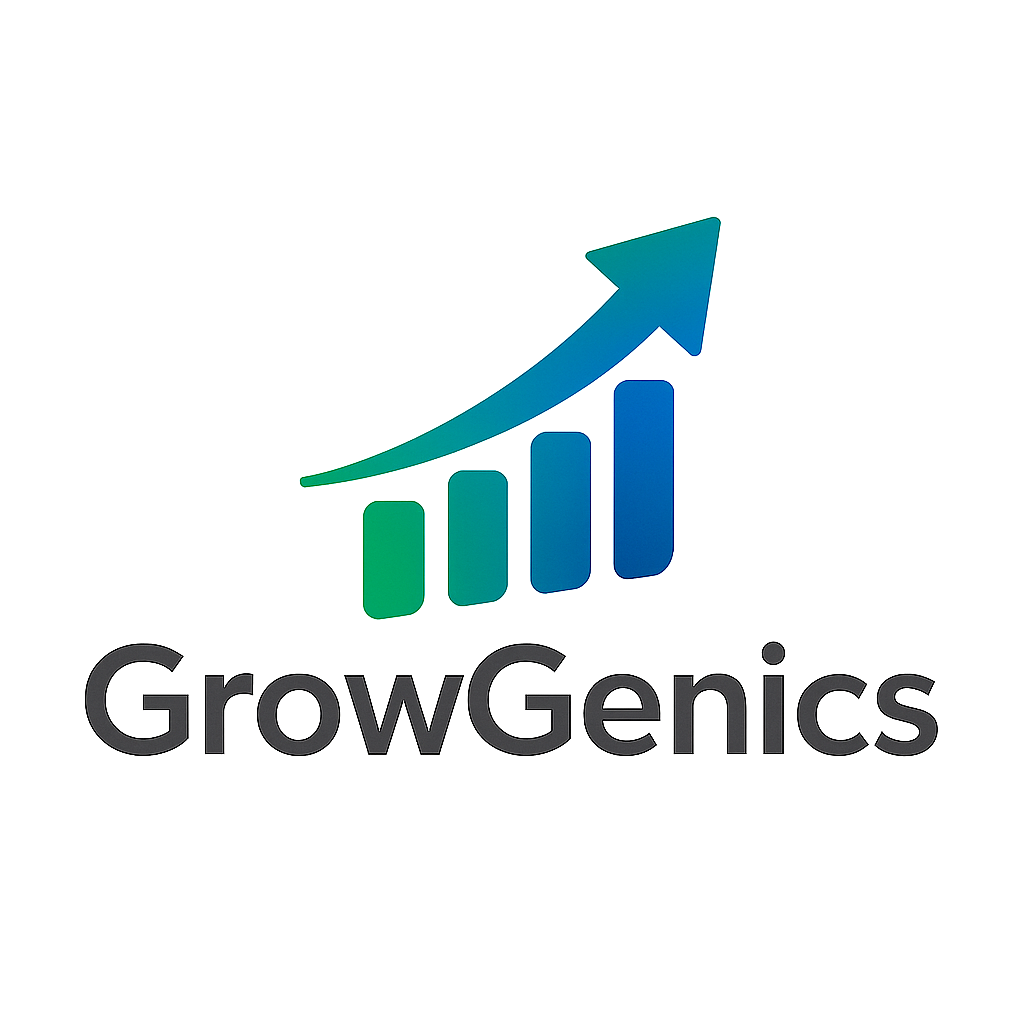
Top 5 Marketing Strategies for Small to Mid-Sized Enterprises to Accelerate Growth
Posted in :
In the competitive world of SMEs and startups, marketing isn’t just about visibility—it’s about strategic acceleration that amplifies brand positioning and fuels sustainable growth.
Here are five potent marketing strategies tailored for SMEs, backed by reliable data, case studies, and a high-impact visual to guide your approach.
1. Content Marketing with Thought Leadership
Trust & Influence: According to the 2024 Edelman–LinkedIn Thought Leadership Impact Report, 73% of business decision-makers say they trust companies based on thought leadership content more than any other marketing material.
-
Quantifiable ROI: A double-blind IBM study highlighted that investing in thought leadership delivered an impressive 156% return on investment, showcasing a profound edge over traditional advertising.
-
Cost Efficiency: Insight-driven content generates up to three times more quality leads compared to outbound strategies—and typically costs 62% less.
Buffer’s Strategic Content Journey
-
Origins: Buffer launched their blog in January 2011; by 2013 they hit 1 million monthly sessions, and by mid-2017, they reached 1.5 million visits per month—with content as the engine.Buffer
-
Audience Development: They published over 1,000 posts, focusing on long-form, educational, and actionable content—perfectly aligned with their customer needs.Buffer
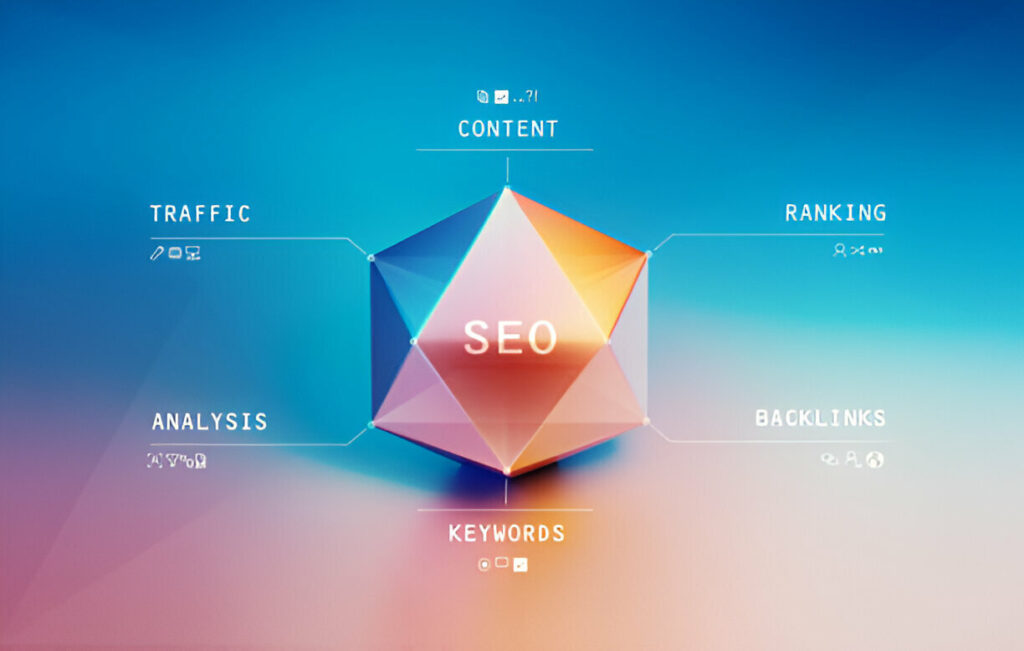
- Business Impact: This content strategy directly supported product adoption, brand building, and trust—an example of how SMEs can scale mindshare without massive ad spend.
Why It Matters for SMEs
-
Establishes category distinction—you become the consultative leader, not just a vendor.
-
Enables growth through organic inbound momentum, reducing dependence on ad budgets.
-
Builds long-term credibility, a powerful competitive advantage when resources are lean.
That leads us to understand the power of content marketing through storytelling:
Content Marketing via Authentic Storytelling
The Strategy: Position your business as an industry leader by creating engaging content that speaks to your audience’s values and needs.
Sweet Treats by Sarah, a home-based bakery, launched a blog featuring recipes, baking tips, and charming storytelling. Within a year, increased web traffic directly translated to custom orders and enabled Sarah to open a brick-and-mortar shop.
Content fosters emotional connection and trust, enabling small businesses to scale beyond local limitations.
Here is a table illustrating the Metric/Value:
| Metric / Insight | Value |
|---|---|
| Decision-makers’ trust in thought content | 73% |
| ROI from thought leadership (IBM study) | 156% |
| Lead generation efficiency vs. outbound | 3× |
| Relative cost efficiency | 62% less |
2. Email Marketing with Segmentation & Personalization
Email remains one of the highest ROI channels. According to Omnisend, email marketing delivers an average return of $40 for every dollar spent.
East to implement, hard to beat:
-
Use segmented lists to target product updates, promotions, or educational content.
-
Drive retention through automated sequences based on user behavior.
The Strategy: Personalize messaging to customer segments to improve engagement and sales outcomes.
Hunt Country Small Business—a gourmet retailer—divided its email subscribers into tailored categories (e.g., enthusiasts, corporate buyers, event planners) and delivered personalized content accordingly. The result: higher open/click rates and significant revenue lift in just six months.
Why It Works: Segmentation ensures relevance, reducing unsubscribes and boosting conversions.
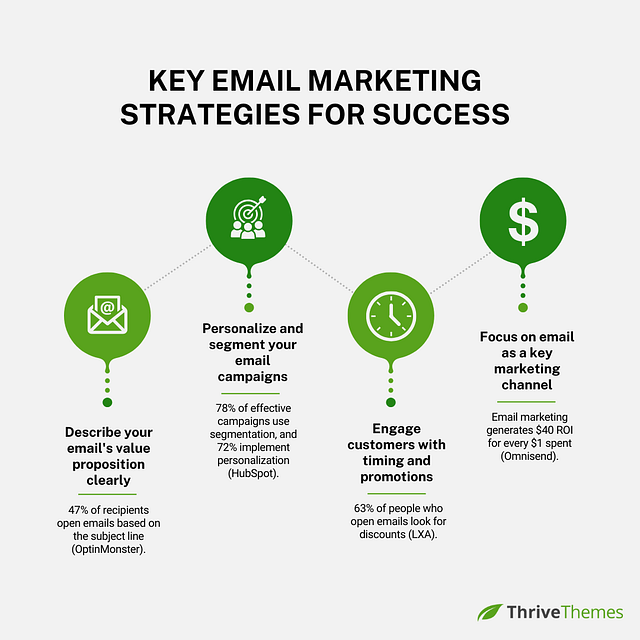
3. Referral & Advocacy Marketing
Word-of-mouth wins. As Infusionsoft found, 62 % of small businesses say customer referrals are among the top 3 most effective growth strategies.
Winning Examples:
-
Dropbox skyrocketed growth using a mutual referral model—free space for both referrer and referred.
-
Ecobee cultivated a community called “VIBees” to pilot products and drive user-generated content—fast-tracking brand trust and reach
The Strategy: Optimize subject lines, content, and automation to boost engagement and ROI.
Case Study:
An e-commerce brand improved conversions by 15%, reduced bounce rate by 25%, and accelerated revenue through revamped segmentation and automated cadence.
Why It Works: Relevant and timely email communication turns a strong channel into a growth engine.

4. Influencer & Local Marketing Partnerships
Why These Strategies Deliver Exceptional ROI
– Influencer Marketing: Amplification Through Authentic Voices
Influencer partnerships offer SMEs leverage far beyond their size. Key reasons they perform:
-
Credibility & Trust by Association: 63% of consumers trust influencer recommendations more than brand-led advertising.
-
High Engagement Rates: Micro-influencers—those with 10K–50K followers—often drive up to 60% higher engagement than mega-influencers.
- Cost-Effective Reach: Small fashion boutiques have reported 4× return on investment (ROI) from well-targeted influencer campaigns.
A study case was made on a boutique stationery brand collaborated with a micro-influencer specializing in journaling.
With a small budget ($1,500) and a handful of sponsored posts, the brand saw 2.5× increase in online sales and captured new subscribers—at about 5× lower cost per acquisition than paid ads.

– Local Business Partnerships: Community-Driven Growth
Collaborating with complementary local businesses (e.g., a café and a bookstore, or a gym and a health food store) provides:
-
Mutual Referral Channels: Each business gains access to the other’s customer base.
-
Shared Marketing Costs: Collaborative flyers, email cross-promotions, or co-hosted workshops reduce individual spend.
-
Enhanced Community Trust: Customers are more likely to try a new offering when it’s endorsed by another local business they already trust.
Another example:
A small fitness studio partnered with a health juice bar. Both promoted the other’s offerings via social media, in-store posters, and joint “wellness mornings.” The studio increased new trial sign-ups by 30%, while the juice bar boosted morning sales by 25%—all with a combined additional marketing cost under $400 per month.
How to Execute These Strategies Effectively
I. Set Clear Objectives
-
-
Are you aiming for brand awareness, lead generation, or repeat business?
-
For influencer campaigns: specify metrics like engagement rate, website traffic, or conversion.
-
For local partnerships: define cross-promotion goals, such as referral volume or joint event attendance.
-
-
II. Select Right-Sized Partners
-
Influencers: Look for alignment in values, tone, and relevance—not just follower count.
-
Local Partners: Choose businesses whose customer base complements yours but doesn’t directly compete.
-
-
III. Define Collaborative Mechanics
-
Influencer Contracts: Set clear deliverables (e.g., number of posts, story mentions, swipe-ups).
-
Local Collaboration: Agree on promotion methods—e.g., coupon exchanges, packaged offers, or shared content on social media.
-
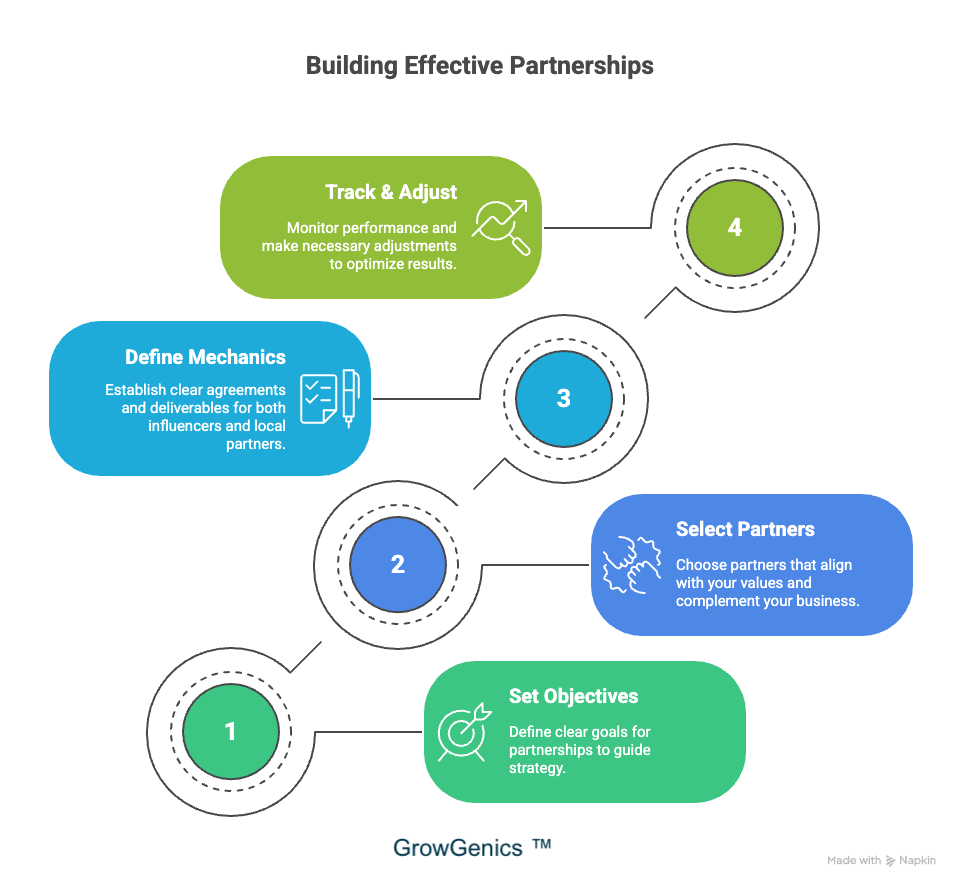
IV. Track & Adjust
-
-
Use UTM links for influencer or partner posts to monitor traffic and conversions.
-
Set short-term pilots (e.g., one month), review results, and refine or scale accordingly.
-
| Strategy Type | Key Benefit | Example ROI / Outcome |
|---|---|---|
| Influencer Marketing | Reach + trust via authentic voice | 4× ROI for small fashion boutiques |
| Local Partnerships | Cost-effective community traction | 30% increase in sign-ups; 25% rise in sales |
5. Digital Optimization: SEO, Local Search & AI Tools
The Strategy: Dominate local search results through targeted landing pages, Google My Business optimization, and backlinks.
Case Study:
A luxury interior design firm executed a local SEO strategy across three locations, achieving #1 rankings for competitive keywords, generating 250–270 qualified leads, and adding over $3 million in annual revenue.Reddit+1Reddit+1
Why It Works: Local SEO ensures visibility where it matters most—driving high-intent customer traffic with low acquisition cost.
SMEs dominate locally; appearing in local searches greatly increases visibility. Around 77% of small businesses leverage social media, and 67% use SEO to boost traffic.
Adding AI supercharges this: The University of St Andrews found AI adoption among SMEs can improve productivity by 27%–133%, including marketing efficiency for small businesses implementing AI content tools.
A UK gift shop owner uses ChatGPT to draft product descriptions, doubling marketing output efficiency without losing brand voice—resulting in noticeable sales lift during seasonal peaks.
Why It Matters for SMEs:
Local SEO ensures you appear where it counts. AI tools help leapfrog resource constraints—achieving scale, precision, and effectiveness often reserved for larger competitors.
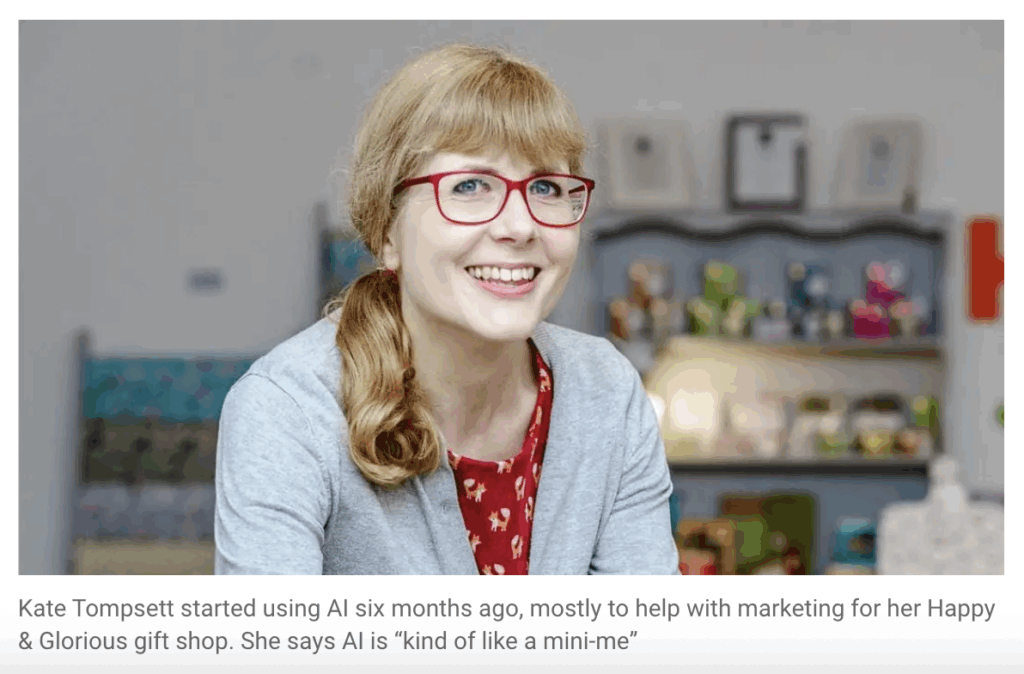
Dominate local search results through targeted landing pages, Google My Business optimization, and backlinks.
A luxury interior design firm executed a local SEO strategy across three locations, achieving #1 rankings for competitive keywords, generating 250–270 qualified leads, and adding over $3 million in annual revenue.Reddit+1Reddit+1
Local SEO ensures visibility where it matters most—driving high-intent customer traffic with low acquisition cost.
| Strategy | Key Benefit | Real-World Result |
|---|---|---|
| Content Marketing | Builds trust & brand equity | Bakery opens shop via blog growth |
| Segmented Email | Higher engagement & sales | Revenue boost & better customer retention |
| Email Overhaul | Increased conversions | +15% conversion, -25% bounce rate |
| Local SEO | High-intent traffic | $3M revenue added via local SEO |
| Digital Advertising | Rapid scaling and ROI | 1,039% ROI for Hydrate Medical |
By blending consistent content, personalized email, search optimization, and smart advertising, SMEs can punch above their weight—delivering growth at a fraction of the cost of larger competitors.
In the table below, providing an average of each strategy, the impact it creates, and areas been studied:
| Strategy | Impact Metric | Real-World Example |
|---|---|---|
| Content Marketing | +30 % sales | Local coffee shop. |
| Email Marketing | $40 ROI per $1 | Industry data |
| Referral Marketing | High loyalty & organic reach | Dropbox & Ecobee. |
| Influencer & Local Partnerships | 4× ROI | Fashion boutique. |
| SEO & AI & Local Search | Enhanced visibility & efficiency | Local search & AI usage stats. |
The diagram below illustrates how thought leadership content—when cultivated with authenticity, subject-matter depth, and consistent distribution—builds visibility, engagement, and business trust with compounding benefits over time.
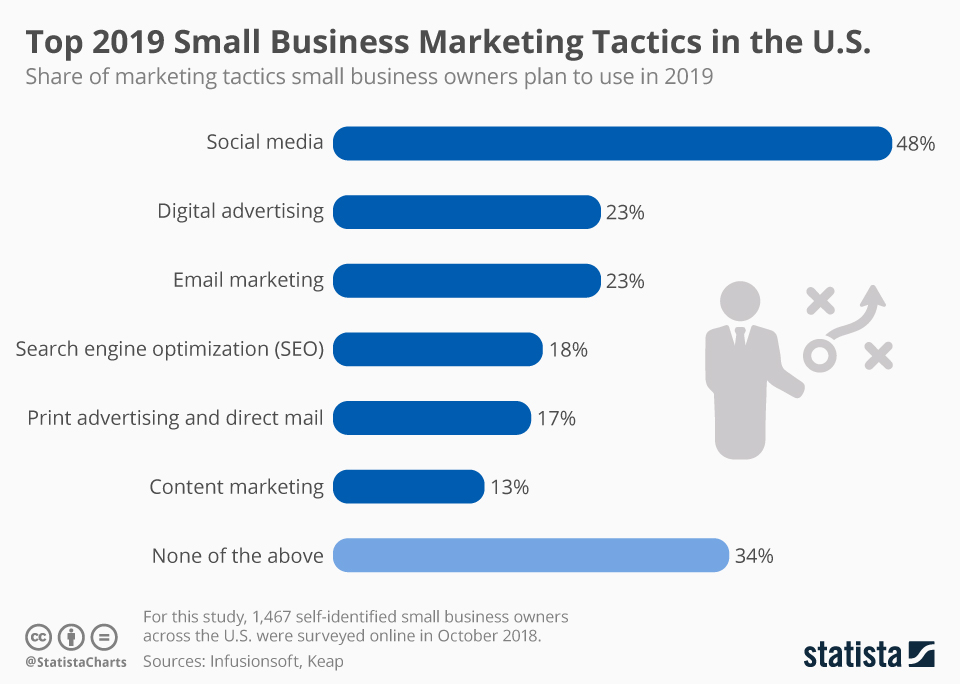
References
-
Coffee shop content success storycmoindex.com
-
Top effectiveness of referrals and email marketing data
-
Buffer case of content marketing leadershipsocontact.com
-
Ecobee’s advocate-based growthListen Innovate Grow
-
Referral examples (Dropbox) and influencer ROIcmoindex.comthesuccesstalks.com
-
Local partnerships recommendationsgigCMO
-
Local SEO and digital marketing impact statsInvestopedia
-
AI adoption and efficiency benefitsThrive Themes
